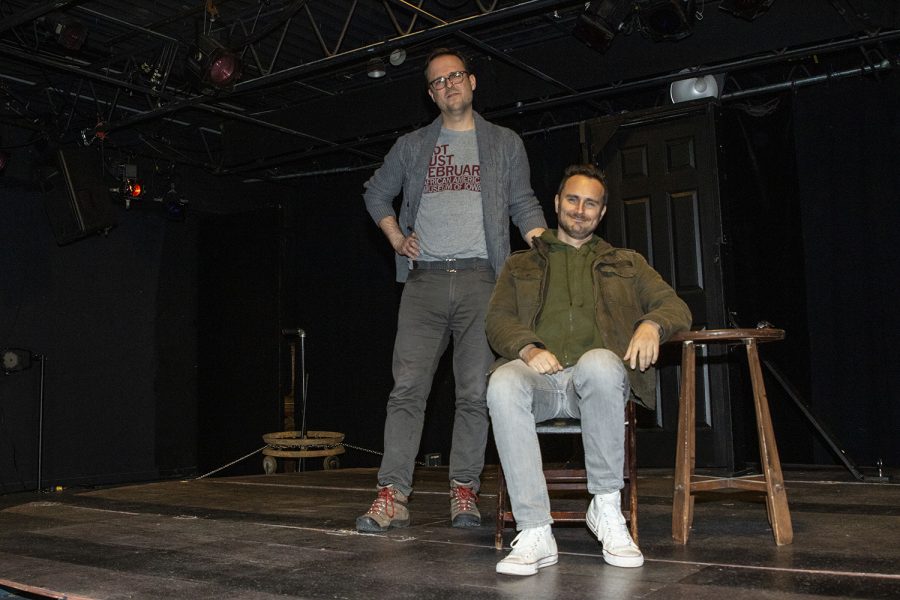A humorous one-person show about one man’s cancer diagnosis, Stages balances tragedy and heart
Stages is a humorous one-person show co-created by award-winning performer David Lee Nelson and Riverside Theatre producing artistic director Adam Knight. The artists shared how they found humor in a tragic story.
Co-creators Adam Knight (left) and David Lee Nelson (right) pose for a portrait in Riverside Theater on Feb. 7, 2020. Stages is a one-person play which focuses on Nelson’s experience with cancer.
February 26, 2020
David Lee Nelson was diagnosed with colon cancer when he was 38 years old. He now re-tells that story in Riverside Theater’s one-man show, Stages, which will perform Friday through March 15. The production hopes to engage audiences, especially during March, National Colorectal Awareness Month, with UI health officials helping to promote the show.
Stages is a collaboration between Nelson and Riverside producing artistic director Adam Knight. The one-man play follows Nelson’s recount of his diagnosis with stage four colon cancer.
Writing autobiographical material wasn’t new territory for Nelson, who originally started as a comedian.
“I was a stand-up comic for a long time, so I’ve always been used to writing about my life and what I’m going through,” Nelson said. “Stages is a very human, very front row look at a very dramatic event in my life. But it’s something that touches so many people.”
This will be Nelson and Knight’s fourth collaboration. The two previously worked together on shows for other theaters, including Silence of Lucky, Status Update, and The Elephant in My Closet.
“Having to choose what stories to tell, I try to take one or two things — little events or seemingly innocuous events — and look for the bigger meaning in them,” Nelson said. “Or a huge event, like getting diagnosed with cancer, and look for the small human moments.”
Unlike the typical role of a director in a solo play, Adam Knight’s role was far more pivotal in the creative process because he worked closely with Nelson to bring his story on stage.
“Working on a new play, the director always has a heavier hand on the first production,” Knight said. “You’re always working intimately with the playwright to make sure that they’re achieving what they intend to achieve. With a solo play, that relationship is more integral to the piece.”
Related: Evita play tells the story of the woman who inspired a nation
The two looked over the blog post and journal entries from Nelson’s time after his diagnosis, which later provided the basis for the show.
“Usually a playwright delivers you a script and you start working with it. But in this case, David and I spent several days on his grandmother’s farm looking through several months of journal entries, blog posts, and things David had written during this point in his life,” Knight said.
Stages will use plenty of projection work to keep audiences enticed with collections of visuals. Knight described the story as being as much visual as it is informative.
The Holden Comprehensive Cancer Center will be sponsoring the show and is holding some events to coincide with it. On March 3 from 9:30 a.m. to 3:30 p.m. at the Atrium Lobby, individuals will be able to walk through a giant inflatable colon and speak to Holden employees about the importance of colon cancer screenings.
On March 7, after a showing of Stages, the cancer center will hold a panel discussion with Muneera R. Kapedia, Alan E. Gunderson, and Saima Sharif.
“I think it’s really brave when patients want to tell their story and talk about their journey,” Sharif said. “The part that strikes me the most about this play is that David’s realization is that as a patient you hear what you want to hear. Whether it’s about his diagnosis or about his treatment. He communicates his emotions in a very raw and real manner.”
Nelson said he wants audiences to know that this is a joyous play; humor is used not to make fun of the issue, but rather to dismantle the pain that comes with it.
“I’m really proud of the way we use laughter and humor, because there’s so much tension in cancer,” Nelson said. “There are funny things that happen. Insane, utterly ridiculous things that happen during this life and death situation. This is a really joyous play and we’re proud of what we created.”














